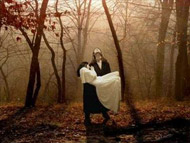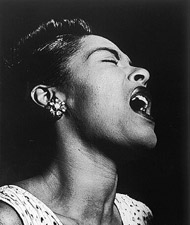



SONG: Gloomy Sunday
"Gloomy Sunday," is a title that refers to a song, popularized in the US by Billie Holiday, which is rumored to have caused suicides in those who fell under its spell (Snopes.com, the ultimate arbiter of urban legends, lists this story as undetermined--good enough for a movie.)
“Gloomy Sunday” | The Lyrics
Sunday is Gloomy,
My hours are slumberless,
Dearest, the shadows I live with are numberless
Little white flowers will never awaken you
Not where the black coach of sorrow has taken you
Angels have no thought of ever returning you
Would they be angry if I thought of joining you
Gloomy Sunday
Sunday is gloomy
with shadows I spend it all
My heart and I have decided to end it all
Soon there'll be flowers and prayers that are sad,
I know, let them not weep,
Let them know that I'm glad to go
Death is no dream,
For in death I'm caressing you
With the last breath of my soul I'll be blessing you
Gloomy Sunday
Dreaming
I was only dreaming
I wake and I find you
Asleep in the deep of
My heart Dear
Darling
I hope that my dream never haunted you
My heart is telling you how much I wanted you
Gloomy Sunday
Utube |“Gloomy Sunday”
http://www.youtube.com/watch?v=iyKXEdnN8b4 http://www.youtube.com/watch?v=8Kkxbw3s2pM&feature=related http://www.youtube.com/watch?v=nGjb0GWwbrA The original song from 1935 http://www.youtube.com/watch?v=E4Hbr6mQHV0
MOVIE: Gloomy Sunday
Synopsys This title is also that of an epic movie set in Budapest before, during, and after the Second World War. "Gloomy Sunday" introduces us to the man who wrote the song, pianist Andras (Stefano Dionisi), the woman he wrote it for (Illona, played by Erika Maroszan), and the man who loved her first, the Jewish businessman Laszlo (Joachim Krol.) Laszlo's restaurant, famous for its outstanding beef rolls, is the focus of the film and the central love triangle. Everybody comes to Laszlo's, including the German Hans Wieck (Ben Becker), who also falls for beautiful Hungarian Illona. "Gloomy Sunday" won German awards for cinematography and direction, and it is easy to see why. The film is accomplished entertainment, well-acted and tastefully decorated. "Love triangle plus Nazi" is an interesting constellation, and lead actress Erika Maroszan, who looks equally gorgeous in period dresses as she does in the countless naked scenes, is beautiful enough to make the trio of tragically smitten men convincing. The film is also more than a little pat, a little dishonest, a little too slick--an artful romance with a historical backdrop and a romantic song that is repeated over and over again, not a serious exploration of the destruction the Third Reich wrought in Eastern Europe. Many details are glossed over or simplified for the sake of the story. Budapest in the thirties. The restaurant owner Laszlo hires the pianist Andres to play in his restaurant. Both men fall in love with the beautiful waitress Ilona who inspires Andres to his only composition. His song of Gloomy Sunday is, at first, loved and then feared, for its melancholic melody triggers off a chain of suicides. The fragile balance of the erotic menage-trois is sent off kilter when the German Hans goes and falls in love with Ilona as well.